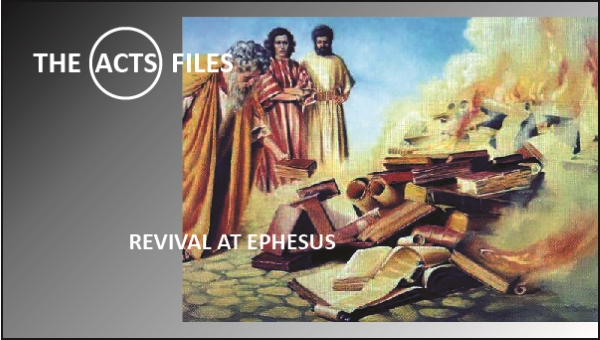By Tyson Thorne

Normally I am not in favor of burning books, even those that disagree with my beliefs. I believe that false teachings are better defeated in public debate than in public book burnings. However, there may have been just cause for doing so in this case. Since items that touched Paul’s body were able to heal and cast out demons (verses 11 and 12) it may be that dark spiritual forces could also “attach” themselves to a physical possession such as a book or scroll. One certainly would not want to pass this along to another by selling the book, or even by burying it in hopes no one finds it. In such a case burning might be the only way to break the connection between the object and a demon, a books teachings (and the spirits behind those teachings) from its reader.
And lest anyone allege that the church is no better than Nazi Germany because both burned books, it should be noted that (one) in Acts the books were burned voluntarily, and (two) they were burned by their owners and not the church.
Luke tells us that the value of the burned books equaled 50,000 silver coins (drachmas). One drachma was a day’s wage. Since the work week at this time was 6 days the value of the books was equal to nearly 160 years of work! This is pointed out to the reader so that there is no mistaking the importance of what happened in Ephesus. These treasured occult items were burned so that the people who burned them would not come under the dominion of evil the way the man who beat Sceva’s sons had. Instead these witches and practitioners of magic and earth worship turned to living God. The demon may have prevailed over the seven brothers, but word of God prevailed over the city.
News of this event spread even wider than the story of the smack-down the Sceva’s received. The city’s turning from idols and witchcraft reached across the Aegean Sea into the provinces of Asia and Achaia and was beginning to impact local economies. Ephesus was a major center of Artemis worship and the man behind the casting of silver Artemis idols (suitable for temples and souvenirs) was Demetrius. Seeing the idol market dip as a result of Paul’s activity Demetrius called the local craftsmen’s union to order and incited them to riot against Paul and the Gospel. His reasons were two-fold: if Christianity continued to spread no one would worship Artemis, and if no one worshiped Artemis they would all be out of work.
Incensed by Demetrius’ speech they stormed the city theater shouting “Great is Artemis of the Ephesians!” Somehow they got their hands on Paul’s traveling companions Gaius and Aristarchus and brought them to the theater too. When Paul heard this he wanted to go as well, but was urged by both the church and friendly political authorities not to. Several hours later the city secretary was able to calm the rioters and disperse them with a warning of legal action. Put another “W” on the board for God.
|
|
|
